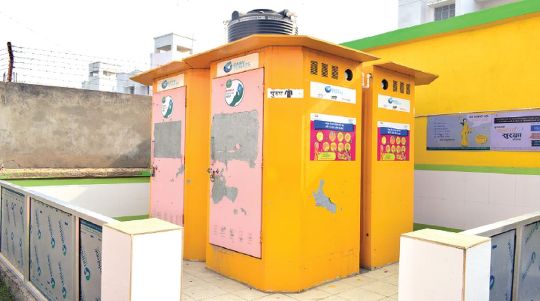Sanitation initiative helps Bihar schools
By The Statesman
December 14, 2018

Tamanna Bhatt is a very enthusiastic and hard-working student of Prakhand School, Phulwari Sharif, Patna. She has been elected Prime Minister of Bal Sansad (Children’s Parliament in her school). As she happily took us around the school, she took special pride in pointing out a well-built new sanitation block with separate toilets for boys and girls.
“Earlier we had problems due to non-existent toilets. Several students had to go in the open. Now this problem is over, and there is a lot of emphasis on hygiene. Any leftover food we save and feed to animals.”
Roshan Kumar Mallick is a student from a poor family in Vaini Middle School (district Samastipur, Bihar). He says, “Earlier I did not care about hygiene but when I was encouraged time and again to improve my habits, I started taking care. Now I feel much better when I am cleaner and find it easier to learn and mix with other children.”
Muskan is a very active student in Middle School, Vaini (Samastipur). She says, “Our school is more beautiful now. We’ve planted so many flowers. We also have trees of lemon and guava as well as Ashok trees.”
Nearly 300 schools in Patna and Samastipur districts of Bihar have seen important improvements in sanitation and water in recent days, thanks to projects implemented recently by the Aga Khan (AK) Rural Support Programme and the Aga Khan Foundation (including an initiative under Dettol Banega Swachh India). Important lessons and role-models for sanitation improvement in schools are emerging from this effort.
In almost all the schools , the AK organizations has contributed new sanitation blocks or is giving the finishing touches to these efforts. Earlier, these schools either had no toilets or those that were, were in a very poor state. In some, girls had no toilets at all. Sometimes, they had to go home to relieve themselves.
The Kasturba School in Vaini (Pusa, Samastipur) is a girls only residential school run by a Trust but even here the toilet was in a very bad shape. The local BDO told that he made a special request to AK activists to take up toilet construction here and now the new toilet here has almost been completed. But the lack of an electricity connection in the school has created other problems. Electricity for the new toilet (and the incinerator to be placed here for getting rid of sanitary pads) has to be arranged from another place.
The well-constructed toilets for boys and girls also have wash basins outside to promote the habit of washing hands.
To ensure that soap is never in short supply, the concept of soap banks has caught on, particularly in Samastipur schools. Students are encouraged (but never coerced) to donate a bar of soap to the school soap-box on their birthday. Teachers also donate soap.
A hygiene corner has also been created in almost all these schools. This is the one-stop place where books, posters and material about hygiene can be found. In some cases, this also includes a first-aid box. In some schools, particularly in Samastipur, children take out rallies in villages with sanitation messages. This has a good impact on villagers. In some schools gardening and greenery work has picked up. However, lack of boundary walls sometimes becomes a hindrance as there is no protection from grazing animals.
The new books which have been made available by AK in these schools for special education on hygiene were highly appreciated by all teachers and headmasters. I saw two hygiene classes being taken on the basis of these books, and there was good involvement of students. Apart from the many obvious questions of personal hygiene and school hygiene, students were also able to answer questions on home and neighborhood hygiene as well as hygiene in illness.
Efforts are made to give information about menstrual hygiene-related issues to senior girl students. They are well-informed on this issue. They can access pads if required from lady teachers or visiting AK field staff. In some of the new toilets for girls, incinerators are provided for disposal of pads.
Several schools have done very creative work in preparing beautiful decorative products from waste materials. A teacher, Neetu of Phulwari Prakhand, has been particularly good in making such products herself and training students. In several schools and classrooms students proudly display such specimens of creative work, which are also referred to as ‘Kabaar Se Jugaar’.
The brightly coloured, attractively designed paintings done at the initiative on AK on several school walls, including toilet walls, help to spread messages of hygiene while also brightening the landscape.
One important feature is that none of these schools have a sanitation staff member. Due to this, sanitation work is shared by the women who cook midday meals, students and to some extent even teachers. Before the morning assembly many students can be seen sweeping the school grounds or collecting trash in bins. Girls are more frequently used for this purpose.
As these are schools where students have a high motivation for hygiene, students repeatedly said that they are happy to shoulder this responsibility. However, teachers and parents everywhere (and students in two schools) also said that there should be one sanitation worker in each school who comes for at least two to three hours in the morning.
Urmila Devi, Member, school management committee, Vaini School says, “We are very happy to see improvement of sanitation. Aga Khan contribution in this is very important. This helps our children a lot. But a separate sanitation official is badly needed.”
© Renalysis Consultants Pvt Ltd





.jpeg)


